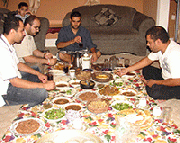Ramadan can be seen in the Detroit area’s Middle Eastern enclaves when decorative lights go up on the outsides of houses, large evening crowds fill bakeries and cafes that were empty during daylight hours, and mosques start to overflow at prayer times throughout the day.

|
|
Abdul Salam Saad, right, of Yemeni origin, breaks fast after sundown on the fifth day of Ramadan at the Dearborn home of his brother Abdul Ghani Saad, with friends Anwar Alduais and Abdul Ghani Jaber as Monier Alduais, 3, watches. In accordance with tradition, female family members broke fast in a separate room because guests from outside the family were present. PHOTO: Khalil AlHajal/TAAN |
In his east Dearborn home during iftar on Wednesday as family and friends gathered to break fast, Abdul Ghani Saad, 34, said an overwhelming feeling of peace comes naturally during the Muslim holy month.
“There’s something inside us that tells us this is a special month. We feel we have to read a lot and pray a lot, watch ourselves, watch our tongues… You feel peace in your soul,” he said.
His neighbor Anwar Alduais, 32, said the feeling comes as soon as Ramadan starts.
“From the first day, you feel everything has changed,” he said.
Most Muslims began observing the lunar month on Aug. 22. More than a billion around the world devote themselves to prayer, fasting and charity for about 30 days.
The Saad family, of Yemeni descent, breaks fast at sundown by eating dried dates — by tradition eating usually an odd, rather than even, number of dates. Then comes prayer, followed by a light meal.
Yemeni food is distinct from more widely-known Middle Eastern cuisines. Yemen’s national dish salta, a spicy, meat-based stew, usually centers a meal and some dishes are made specifically for Ramadan, like sambusa, miniature, triangular meat pies, and shafut, a green yogurt-soup.

|
|
Abdul Ghani Saad, R, pours juice for neighbors Anwar Alduais and Abdul Ghani Jaber during Iftar on Wednesday. |
“They always ask me ‘When is Ramadan coming? When is Ramadan coming,'” he said.
Gathering around the television after iftar for suspenseful Arab World soap operas is a relatively new tradition that has developed in many Muslim families, who watch the shows made specifically for Ramadan via satellite.
A favorite in the Saad household is Bab Al Hara, a series that chronicles neighborhood dramas in Syria during French rule. The show took Arab audiences by storm in 2006 and has returned every Ramadan since, sparking a widespread trend.
Saad said a trip to the mosque for more prayer usually follows watching the show in the Ramadan routine. Followed by another, heavier meal, sleep, and an early-morning rise around 4 a.m. for a light meal before the sun comes up.
Children milled about the room Wednesday in the Saad home, but they’re too young to fast.

|
|
Saad and Jaber pray after breaking fast. |
He said they start to explain the concept to them, allow them to fast for small parts of the day and have them play games like eating with their eyes closed, to introduce them to the change in routine.
By about ten years old, they usually begin fasting on their own.
“They’re not forced, but they’ve got to try,” he said.
For Saad, spiritual focus during Ramadan also provides him a break from stress and worry over work and everyday problems that often consume him the other 11 months of the year.
“Now,” he said. “I don’t even think about it.”






Leave a Reply